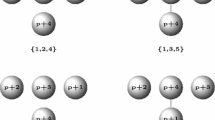Abstract
Orbital branching is a method for branching on variables in integer programming that reduces the likelihood of evaluating redundant, isomorphic nodes in the branch-and-bound procedure. In this work, the orbital branching methodology is extended so that the branching disjunction can be based on an arbitrary constraint. Many important families of integer programs are structured such that small instances from the family are embedded in larger instances. This structural information can be exploited to define a group of strong constraints on which to base the orbital branching disjunction. The symmetric nature of the problems is further exploited by enumerating non-isomorphic solutions to instances of the small family and using these solutions to create a collection of typically easy-to-solve integer programs. The solution of each integer program in the collection is equivalent to solving the original large instance. The effectiveness of this methodology is demonstrated by computing the optimal incidence width of Steiner Triple Systems and minimum cardinality covering designs.
Preview
Unable to display preview. Download preview PDF.
Similar content being viewed by others
References
Macambira, E.M., Maculan, N., de Souza, C.C.: Reducing symmetry of the SONET ring assignment problem using hierarchical inequalities. Technical Report ES-636/04, Programa de Engenharia de Sistemas e Computação, Universidade Federal do Rio de Janeiro (2004)
Rothberg, E.: Using cuts to remove symmetry. In: 17th International Symposium on Mathematical Programming (2000)
Sherali, H.D., Smith, J.C.: Improving zero-one model representations via symmetry considerations. Management Science 47(10), 1396–1407 (2001)
Kaibel, V., Pfetsch, M.: Packing and partitioning orbitopes. Mathematical Programming (to appear, 2007)
Kaibel, V., Peinhardt, M., Pfetsch, M.: Orbitopal fixing. In: Fischetti, M., Williamson, D.P. (eds.) IPCO 2007. LNCS, vol. 4513, pp. 74–88. Springer, Heidelberg (2007)
Read, R.C.: Every one a winner or how to avoid isomorphism search when cataloguing combinatorial configurations. Annals of Discrete Mathematics 2, 107–120 (1998)
Butler, G., Lam, W.H.: A general backtrack algorithm for the isomorphism problem of combinatorial objects. Journal of Symbolic Computation 1, 363–381 (1985)
McKay, D.: Isomorph-free exhaustive generation. Journal of Algorithms 26, 306–324 (1998)
Margot, F.: Pruning by isomorphism in branch-and-cut. Mathematical Programming 94, 71–90 (2002)
Ostrowski, J., Linderoth, J., Rossi, F., Smriglio, S.: Orbital branching. In: Fischetti, M., Williamson, D.P. (eds.) IPCO 2007. LNCS, vol. 4513, pp. 104–118. Springer, Heidelberg (2007)
Linderoth, J., Margot, F., Thain, G.: Improving bounds on the football pool problem via symmetry reduction and high-throughput computing (submitted, 2007)
Mannino, C., Sassano, A.: Solving hard set covering problems. Operations Research Letters 18, 1–5 (1995)
Karamanov, M., Cornuéjols, G.: Branching on general disjunctions (submitted, 2005)
Kirkman, T.P.: On a problem in combinations. Cambridge and Dublin Mathematics Journal 2, 191–204 (1847)
Fulkerson, D.R., Nemhauser, G.L., Trotter, L.E.: Two computationally difficult set covering problems that arise in computing the 1-width of incidence matrices of Steiner triples. Mathematical Programming Study 2, 72–81 (1974)
Avis, D.: A note on some computationally difficult set covering problems. Mathematical Programming 8, 138–145 (1980)
Hall, M.: Combinatorial Theory. Blaisdell Company (1967)
Feo, T.A., Resende, G.C.: A probabilistic heuristic for a computationally difficult set covering problem. Operations Research Letters 8, 67–71 (1989)
Karmarkar, N., Ramakrishnan, K., Resende, M.: An interior point algorithm to solve computationally difficult set covering problems. Mathematical Programming, Series B 52, 597–618 (1991)
Odijk, M.A., van Maaren, H.: Improved solutions to the Steiner triple covering problem. Information Processing Letters 65(2), 67–69 (1998)
The GAP Group: GAP—Groups, Algorithms, and Programming, Version 4.4 (2004), http://www.gap-system.org
Danna, E., Fenelon, M., Gu, Z., Wunderling, R.: Generating multiple solutions for mixed integer programming problems. In: Fischetti, M., Williamson, D.P. (eds.) IPCO 2007. LNCS, vol. 4513, pp. 280–294. Springer, Heidelberg (2007)
Livny, M., Basney, J., Raman, R., Tannenbaum, T.: Mechanisms for high throughput computing. SPEEDUP 11 (1997)
Schönheim, J.: On coverings. Pacific Journal of Mathematics 14, 1405–1411 (1964)
Margot, F.: Exploiting orbits in symmetric ILP. Mathematical Programming, Series B 98, 3–21 (2003)
Nurmela, K.J., Östergård, P.: Upper bounds for covering designs by simulated annealing. Congressus Numerantium 96, 93–111 (1993)
Applegate, D., Rains, E., Sloane, N.: On asymmetric coverings and covering numbers. Journal of Combinatorial Designs 11, 218–228 (2003)
Gordon, D., Kuperberg, G., Patashnik, O.: New constructions for covering designs. Journal of Combinatorial Designs 3, 269–284 (1995)
Margot, F.: Small covering designs by branch-and-cut. Mathematical Programming 94, 207–220 (2003)
Author information
Authors and Affiliations
Editor information
Rights and permissions
Copyright information
© 2008 Springer-Verlag Berlin Heidelberg
About this paper
Cite this paper
Ostrowski, J., Linderoth, J., Rossi, F., Smriglio, S. (2008). Constraint Orbital Branching. In: Lodi, A., Panconesi, A., Rinaldi, G. (eds) Integer Programming and Combinatorial Optimization. IPCO 2008. Lecture Notes in Computer Science, vol 5035. Springer, Berlin, Heidelberg. https://doi.org/10.1007/978-3-540-68891-4_16
Download citation
DOI: https://doi.org/10.1007/978-3-540-68891-4_16
Publisher Name: Springer, Berlin, Heidelberg
Print ISBN: 978-3-540-68886-0
Online ISBN: 978-3-540-68891-4
eBook Packages: Computer ScienceComputer Science (R0)




